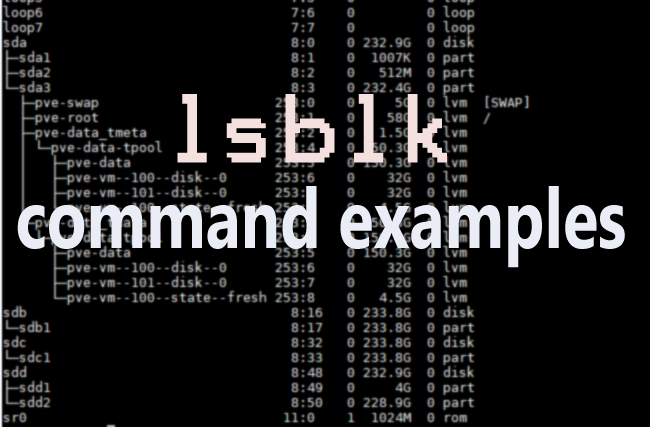6 Linux lsblk command examples

6 Linux lsblk Command Examples
lsblk useful terminal command for analysis Linux storage devices.
lsblk – LiSt BLocK devices. Linux lsblk command lists information about all available or the specified block devices – disks. The lsblk command reads the sysfs filesystem and udev db to gather information. If the udev db is not available or lsblk is compiled without udev support than it tries to read LABELs, UUIDs and filesystem types from the block device. In this case root permissions are necessary.
The lsblk command prints all block devices (except RAM disks) in a tree-like format by default.
To get list off all available options use lsblk –help or man lsblk. Also full documentation available in LSBLK Linux man page.
1. Example output of lsblk command without any options :
$ lsblk NAME MAJ:MIN RM SIZE RO TYPE MOUNTPOINT loop0 7:0 0 88.5M 1 loop /snap/core/7270 loop1 7:1 0 88.7M 1 loop /snap/core/7396 sda 8:0 0 7.3T 0 disk ├─sda1 8:1 0 1M 0 part ├─sda2 8:2 0 1G 0 part /boot └─sda3 8:3 0 7.3T 0 part └─ubuntu--vg-ubuntu--lv 253:0 0 7.3T 0 lvm / sdb 8:16 0 7.3T 0 disk └─sdb1 8:17 0 7.3T 0 part sr0 11:0 1 1024M 0 rom
2. Same as previous command, but just list disks without tree-like formatting:
$ lsblk -l NAME MAJ:MIN RM SIZE RO TYPE MOUNTPOINT loop0 7:0 0 88.5M 1 loop /snap/core/7270 loop1 7:1 0 88.7M 1 loop /snap/core/7396 sda 8:0 0 7.3T 0 disk sda1 8:1 0 1M 0 part sda2 8:2 0 1G 0 part /boot sda3 8:3 0 7.3T 0 part sdb 8:16 0 7.3T 0 disk sdb1 8:17 0 7.3T 0 part sr0 11:0 1 1024M 0 rom ubuntu--vg-ubuntu--lv 253:0 0 7.3T 0 lvm /
3. This example will print the SIZE column in bytes rather than in a human-readable format:
$ lsblk -b NAME MAJ:MIN RM SIZE RO TYPE MOUNTPOINT sda 8:0 0 34359738368 0 disk ├─sda1 8:1 0 1073741824 0 part /boot └─sda2 8:2 0 33284947968 0 part ├─centos-root 253:0 0 31130124288 0 lvm / └─centos-swap 253:1 0 2147483648 0 lvm [SWAP] sr0 11:0 1 962592768 0 rom
4. Option -f or –fs will show info about filesystem:
$ lsblk -f NAME FSTYPE LABEL UUID MOUNTPOINT sda ├─sda1 xfs 4cd404a1-275c-4614-870e-d2936c11ddd6 /boot └─sda2 LVM2_member 7BSlmC-9Q30-M68i-R9Os-oExP-wMky-nTd7fs ├─centos-root xfs dcb861b3-fdde-41d8-8c4b-f4859d400bac / └─centos-swap swap 25441b13-1886-4b47-b72a-e5d0c16982a7 [SWAP] sr0 iso9660 CentOS 7 x86_64 2018-11-25-21-21-31-00
5. lsblk -d will not output holder devices or slaves. In my case, lsblk -d /dev/sdb prints information about the sdb device only:
$ lsblk -d /dev/sdb NAME MAJ:MIN RM SIZE RO TYPE MOUNTPOINT sdb 8:16 0 233.8G 0 disk
6. In last example I want to show -D or –discard, which printing information about devices discarding capabilities:
$ lsblk --discard
NAME DISC-ALN DISC-GRAN DISC-MAX DISC-ZERO
sda 0 0B 0B 0
├─sda1 0 0B 0B 0
├─sda2 0 0B 0B 0
└─sda3 0 0B 0B 0
├─pve-swap 0 0B 0B 0
├─pve-root 0 0B 0B 0
├─pve-data_tmeta 0 0B 0B 0
│ └─pve-data-tpool 0 0B 0B 0
│ ├─pve-data 0 0B 0B 0
│ ├─pve-vm--100--disk--0 0 64K 16G 0
│ ├─pve-vm--101--disk--0 0 64K 16G 0
│ └─pve-vm--100--state--fresh 0 64K 16G 0
└─pve-data_tdata 0 0B 0B 0
└─pve-data-tpool 0 0B 0B 0
├─pve-data 0 0B 0B 0
├─pve-vm--100--disk--0 0 64K 16G 0
├─pve-vm--101--disk--0 0 64K 16G 0
└─pve-vm--100--state--fresh 0 64K 16G 0
sdb 0 0B 0B 0
└─sdb1 0 0B 0B 0
sdc 0 0B 0B 0
└─sdc1 0 0B 0B 0
sdd 0 0B 0B 0
├─sdd1 0 0B 0B 0
└─sdd2 0 0B 0B 0
sr0 0 0B 0B 0






